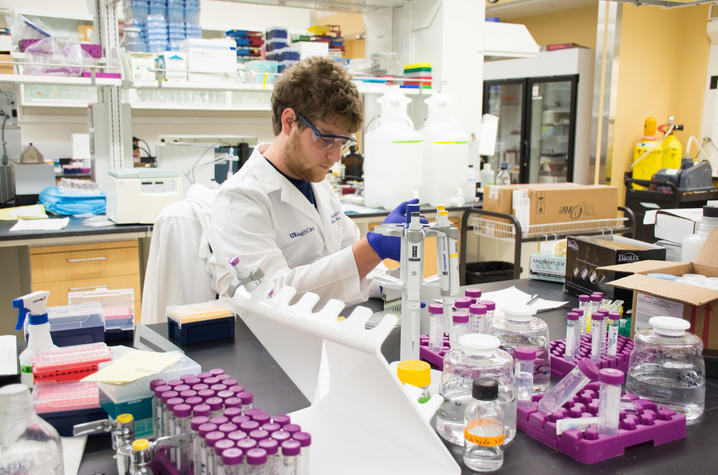UK College of Pharmacy Researchers Uncover New Biomarker for Cardiovascular Disease
LEXINGTON, Ky. (Dec. 19, 2019) — Heart disease is the leading cause of death in the United States and, according to the Centers for Disease Control and Prevention (CDC), Kentucky consistently ranks in the top 10 states for heart disease deaths.
The CDC reports more than 10,000 Kentuckians died of heart disease in 2017.
A new biomarker, uncovered by researchers in the University of Kentucky College of Pharmacy, could change cardiovascular care for patients with high risk of disease.
Pharmacy graduate students David Henson (in the MD/PhD program) and David Nardo, PharmD (who were both supported by UK Center for Clinical and Translational Science’s NIH-funded TL1 pre-doctoral training program) worked in the lab of Vincent Venditto to uncover potential new indicators of heart disease. Referred to as biomarkers, these indicators can be a sign that a patient is at risk for cardiovascular issues.
The group tested the association between adverse cardiovascular events, like heart attacks and strokes, and Apolipoprotein A-I (ApoA-I), which is a protein that helps carry fats and cholesterol through the bloodstream. Their findings, recently published by American Heart Association Journals, identified a unique form of ApoA-I that has an immune molecule, or antibody, coupled with it. High levels of this ApoA-I/antibody complex are associated with improved patient outcomes. Coupling this with low levels of high-density lipoprotein (HDL), the “good cholesterol,” and factors like family history, age, sex and smoking, may help doctors treat at-risk patients before their symptoms worsen.
“The implications for this data are exciting,” Venditto said. “We look forward to evaluating this biomarker in a larger cohort of patients and uncovering the role of this biomarker in cardiovascular disease.”
Past research has found that antibodies in circulation targeting ApoA-I increase the risk of heart disease, but this research found ApoA-I/antibodies as an unexplored component of the immune response that is associated with improved survival in patients with cardiovascular disease.
Biomarkers have become a critical component for creating preventative and individualized treatments for patients. Knowing about these biomarkers allow physicians to take a more proactive approach in cardiovascular care.
“Our hope is that our research will bring Kentucky’s heart disease numbers down. If we remain persistent, pushing the boundaries of what we already know, we can lessen the impact of heart disease both in Kentucky and in the entire U.S.” said Nardo.
This research was supported by the NIH through a Clinical and Translational Science Award to the UK Center for Clinical and Translational Science, which provided pre-doctoral TL1 training as well as biospecimen resources for the research. Support was also provided by the American Heart Association.
As the state’s flagship, land-grant institution, the University of Kentucky exists to advance the Commonwealth. We do that by preparing the next generation of leaders — placing students at the heart of everything we do — and transforming the lives of Kentuckians through education, research and creative work, service and health care. We pride ourselves on being a catalyst for breakthroughs and a force for healing, a place where ingenuity unfolds. It's all made possible by our people — visionaries, disruptors and pioneers — who make up 200 academic programs, a $476.5 million research and development enterprise and a world-class medical center, all on one campus.






